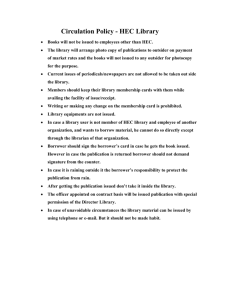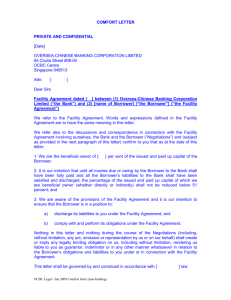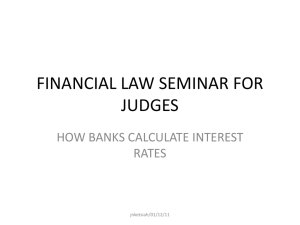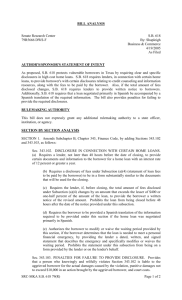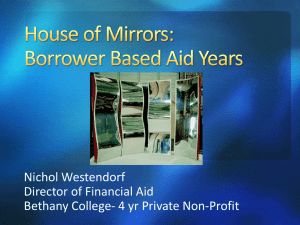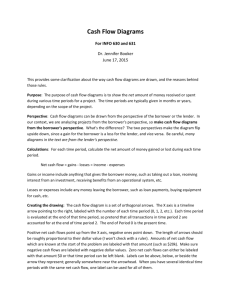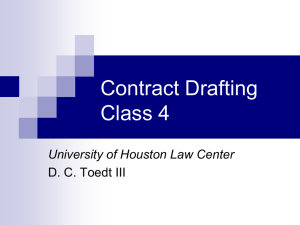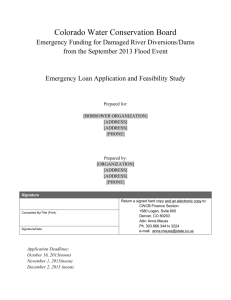Cash Flow Analysis (Form 1084)
advertisement
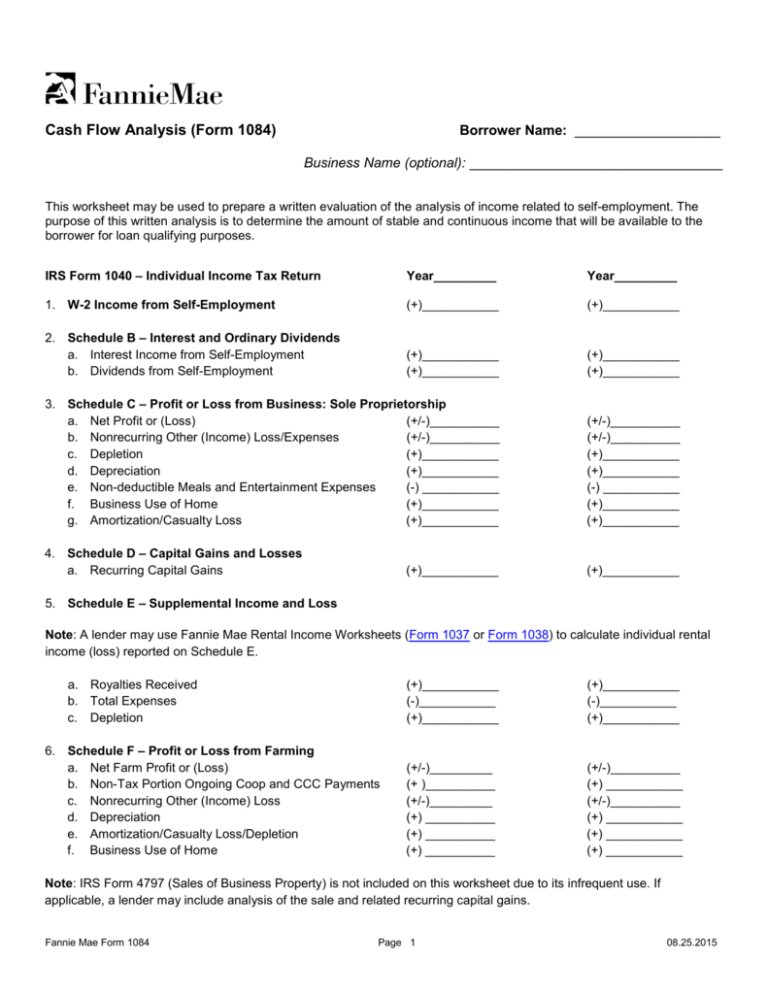
Cash Flow Analysis (Form 1084) Borrower Name: ___________________ Business Name (optional): _________________________________ This worksheet may be used to prepare a written evaluation of the analysis of income related to self-employment. The purpose of this written analysis is to determine the amount of stable and continuous income that will be available to the borrower for loan qualifying purposes. IRS Form 1040 – Individual Income Tax Return Year_________ Year_________ 1. W-2 Income from Self-Employment (+)___________ (+)___________ 2. Schedule B – Interest and Ordinary Dividends a. Interest Income from Self-Employment b. Dividends from Self-Employment (+)___________ (+)___________ (+)___________ (+)___________ 3. Schedule C – Profit or Loss from Business: Sole Proprietorship a. Net Profit or (Loss) (+/-)__________ b. Nonrecurring Other (Income) Loss/Expenses (+/-)__________ c. Depletion (+)___________ d. Depreciation (+)___________ e. Non-deductible Meals and Entertainment Expenses (-) ___________ (+)___________ f. Business Use of Home g. Amortization/Casualty Loss (+)___________ (+/-)__________ (+/-)__________ (+)___________ (+)___________ (-) ___________ (+)___________ (+)___________ 4. Schedule D – Capital Gains and Losses a. Recurring Capital Gains (+)___________ (+)___________ 5. Schedule E – Supplemental Income and Loss Note: A lender may use Fannie Mae Rental Income Worksheets (Form 1037 or Form 1038) to calculate individual rental income (loss) reported on Schedule E. a. Royalties Received b. Total Expenses c. Depletion 6. Schedule F – Profit or Loss from Farming a. Net Farm Profit or (Loss) b. Non-Tax Portion Ongoing Coop and CCC Payments c. Nonrecurring Other (Income) Loss d. Depreciation e. Amortization/Casualty Loss/Depletion f. Business Use of Home (+)___________ (-)___________ (+)___________ (+)___________ (-)___________ (+)___________ (+/-)_________ (+ )__________ (+/-)_________ (+) __________ (+) __________ (+) __________ (+/-)__________ (+) ___________ (+/-)__________ (+) ___________ (+) ___________ (+) ___________ Note: IRS Form 4797 (Sales of Business Property) is not included on this worksheet due to its infrequent use. If applicable, a lender may include analysis of the sale and related recurring capital gains. Fannie Mae Form 1084 Page 1 08.25.2015 Partnership or S Corporation A self-employed borrower’s share of Partnership or S Corporation earnings may be considered provided that the borrower can document ownership share (for example, the Schedule K-1); the borrower can document access to the income; and the business has adequate liquidity to support the withdrawal of earnings. Note: See the Instructions for additional guidance on documenting access to income and business liquidity. IRS Form 1065 - Partnership Income 7. Schedule K-1 Form 1065 – Partner’s Share of Income a. Ordinary Income (Loss) b. Net Rental Real Estate; Other Net Income (Loss) c. Guaranteed Payments to Partner 8. Form 1065 - Adjustments to Business Cash Flow a. Ordinary (Income) Loss from Other Partnerships b. Nonrecurring Other (Income) Loss c. Depreciation d. Depletion e. Amortization/Casualty Loss f. Mortgages or Notes Payable in Less than 1 Year g. Non-deductible Travel and Entertainment Expenses h. Subtotal i. Total Form 1065 (Subtotal multiplied by % of ownership) Year__________ (+/-)___________ (+/-)___________ (+)____________ Year__________ (+/-)__________ (+/-)__________ (+) ___________ (+/-)_________ (+/-)_________ (+) __________ (+) __________ (+) __________ (-) __________ (-) __________ ____________ (+/-)__________ (+/-)__________ (+) ___________ (+) ___________ (+) ___________ (-) ___________ (-) ___________ _____________ ____________ _____________ ---------------------------------------------------------------------------------------------------------------------------------------------------------------------------------- IRS Form 1120S – S Corporation Earnings Year__________ 9. Schedule K-1 Form 1120S – Shareholder’s Share of Income a. Ordinary Income (Loss) (+/-)_________ b. Net Rental Real Estate; Other Net Rental Income (Loss) (+/-)_________ 10. Form 1120S - Adjustments to Business Cash Flow a. Nonrecurring Other (Income) Loss b. Depreciation c. Depletion d. Amortization/Casualty Loss e. Mortgages or Notes Payable in Less than 1 Year f. Non-deductible Travel and Entertainment Expenses g. Subtotal h. Total Form 1120S (Subtotal multiplied by % of ownership) Fannie Mae Form 1084 Year__________ (+/-)__________ (+/-)__________ (+/-)_________ (+)__________ (+)__________ (+)__________ (-)__________ (-)__________ ____________ (+/-)__________ (+)___________ (+)___________ (+)___________ (-)___________ (-)___________ _____________ ____________ _____________ Page 2 08.25.2015 IRS Form 1120 – Regular Corporation Corporation earnings may be used when the borrower(s) own 100% of the corporation. 11. Form 1120 – Regular Corporation a. Taxable Income b. Total Tax c. Nonrecurring (Gains) Losses d. Nonrecurring Other (Income) Loss e. Depreciation f. Depletion g. Amortization/Casualty Loss h. Net Operating Loss and Special Deductions i. Mortgages or Notes Payable in Less than 1 Year j. Non-deductible Travel and Entertainment Expenses k. Subtotal l. Less: Dividends Paid to Borrower m. Total Form 1120 Fannie Mae Form 1084 Year_________ Year_________ ____________ (-)__________ (+/-)_________ (+/-)_________ (+)__________ (+)__________ (+)__________ (+)__________ (-)__________ (-)__________ ____________ (-)__________ ____________ _____________ (-)___________ (+/-)__________ (+/-)__________ (+)___________ (+)___________ (+)___________ (+)___________ (-)___________ (-)___________ _____________ (-)___________ _____________ Page 3 08.25.2015 CASH FLOW ANALYSIS (Fannie Mae Form 1084) Instructions Guidance for documenting access to income and business liquidity If the Schedule K-1 reflects a documented, stable history of receiving cash distributions of income from the business consistent with the level of business income being used to qualify, then no further documentation of access to income or adequate business liquidity to support the withdrawal of earnings is required in order to include that income in the borrower’s cash flow. If the Schedule K-1 does not reflect a documented, stable history of receiving cash distributions of income from the business consistent with the level of business income being used to qualify, then the lender must confirm the following to include the income in the borrower’s cash flow: • the borrower can document access to the income (for example, via a partnership agreement or corporate resolution), and • the business has adequate liquidity to support the withdrawal of earnings. Note: The lender is not required to confirm access to the income when the borrower(s) own 100% of the business. IRS Form 1040 – Individual Income Tax Return 1. W-2 Income from Self-Employment: Identify wages paid to the borrower from the borrower’s business. Selfemployment wages may be confirmed by matching the Employer Identification Number (EIN) reported on the borrower’s W-2 with the EIN reported by the borrower’s business. When business tax returns are obtained, W-2 wages can be cross-referenced with compensation of officers reported on Form 1120S or Form 1120. 2. Schedule B – Interest and Ordinary Dividends Line 2a - Interest Income from Self-Employment: Identify interest income paid to the borrower from the borrower’s business. Review Schedule B, Part I and/or IRS Schedule K-1 or Form 1099-Int to confirm the payer is the same entity as the borrower’s business. Line 2b - Dividends from Self-Employment: Identify dividend income paid to the borrower from the borrower’s business. Review Schedule B, Part II and/or IRS Schedule K-1 or Form 1099-Div to confirm the payer is the same entity as the borrower’s business. 3. Schedule C – Profit or Loss from Business: Sole Proprietorship Line 3a - Net Profit or Loss: Record the net profit or (loss) reported on Schedule C. Line 3b - Nonrecurring Other (Income) Loss/ Expense: Other income reported on Schedule C represents income that is not directly related to business receipts. Deduct other income unless the income is determined to be recurring. If the income is determined to be recurring, no adjustment is required. Other loss may be added back when it is determined that the loss will not continue. Line 3c - Depletion: Add back the amount of the depletion deduction reported on Schedule C. Line 3d - Depreciation: Add back the amount of the depreciation deduction reported on Schedule C. Vehicle depreciation included as part of the standard mileage deduction may be added back by multiplying the business miles driven by the depreciation factor for the respective year. Instructions Page 1 Line 3e - Non-deductible Meals and Entertainment Expenses: Deduct the portion of business-related meals and entertainment expenses that have been excluded for tax reporting purposes. These expenses, to the full extent they are incurred, are taken into account; therefore, the portion of these expenses that have been excluded must be identified and subtracted from business cash flow. Line 3f - Business Use of Home: Add back the expenses deducted for the business use of home. Line 3g - Amortization/Casualty Loss: Add back the expense deducted for amortization along with the expense associated with non-recurring casualty loss. 4. Schedule D – Capital Gains and Losses Line 4a - Recurring Capital Gains: Identify the amount of recurring capital gains. Schedule D may report business capital gains passed through to the borrower on Schedule K-1 (IRS Form 1065 or IRS Form 1120S). Do not include business capital gains which are sporadic or result from a one-time transaction. Note: Business capital losses identified on Schedule D do not have to be considered when calculating income or liabilities, even if the losses are recurring. 5. Schedule E – Supplemental Income and Loss Note: Use Fannie Mae Rental Income Worksheets (Form 1037 or Form 1038) to evaluate individual rental income (loss) reported on Schedule E. Refer to Selling Guide, B3-3.1-08, Rental Income, for additional details. Partnerships and S corporation income (loss) reported on Schedule E is addressed below. Line 5a - Royalties Received: Include royalty income which meets eligibility standards. Line 5b - Total Expenses: Deduct the expenses related to royalty income used in qualifying the borrower. Line 5c - Depletion: Add back the amount of the depletion deduction related to royalty income used in qualifying the borrower. 6. Schedule F – Profit or Loss from Farming Line 6a - Net Farm Profit or (Loss): Record the net farm profit or (loss) reported on Schedule F. Line 6b - Non-taxable Portion of Ongoing Coop and CCC Payments: Certain federal agriculture program payments, coop distributions, and insurance/loan proceeds are not fully taxable. Add back the nontaxable portion of these income types provided these sources of income are likely to continue and do not represent a one-time occurrence. Line 6c - Nonrecurring Other (Income) Loss: Other income reported on Schedule F represents income received by a farmer that was not obtained through farm operations. Deduct other income unless the income is determined to be recurring. If the income is determined to be recurring, no adjustment is required. Other loss may be added back when it is determined that the loss will not continue. Line 6d - Depreciation: Add back the amount of the depreciation deduction reported on Schedule F. Line 6e - Amortization/Casualty Loss/Depletion: Add back the expense deducted for amortization/depletion along with the expense associated with non-recurring casualty loss. Line 6f - Business Use of Home: Add back the expenses deducted for the business use of home. Instructions Page 2 Partnership or S Corporation IRS Form 1065 – Partnership Income 7. Schedule K-1 Form 1065 – Partner’s Share of Income: Line 7a - Ordinary Income (Loss): Record the amount of ordinary income (loss) reported to the borrower in Box 1 of Schedule K-1 (Form 1065). Line 7b - Net Rental Real Estate; Other Net Income (Loss): Record the amount of net rental real estate; other net income (loss) reported to the borrower in Box 2 and/or 3 of Schedule K-1 (Form 1065). Line 7c - Guaranteed Payments to Partner: Add guaranteed payments to partner when the borrower has a twoyear history of receipt. 8. Adjustments to Business Cash Flow – Form 1065 When business tax returns are obtained by the lender, the following adjustments to business cash flow should be made. Line 8a - Ordinary income (loss) from other Partnerships: In order to consider ordinary income from other partnerships, the lender must obtain additional documentation to confirm the income passed through from the other partnership to the borrower’s business meets partnership income eligibility standards. Deduct ordinary income passed through to the borrower’s business from other partnerships unless this additional action is taken. Losses passed through to the borrower’s business may be added back when the lender determines pass-through losses are not likely to continue. Line 8b - Nonrecurring Other (Income) Loss: Other income reported on Form 1065 generally represents income that is not directly related to business receipts. Deduct other income unless the income is determined to be recurring. If the income is determined to be recurring, no adjustment is required. Other loss may be added back when it is determined that the loss will not continue. Line 8c - Depreciation: Add back the amount of the depreciation deduction reported on Form 1065 and/or on Form 8825. Line 8d - Depletion: Add back the amount of the depletion deduction reported on Form 1065. Line 8e - Amortization/Casualty Loss: Add back the expense deducted for amortization/depletion along with the expense associated with non-recurring casualty loss. Line 8f - Mortgage or Notes Payable in Less than 1 Year: Subtract the amount of mortgage or note obligations payable in less than one year, as reported in Schedule L of Form 1120S, end of year column. This deduction is not required for lines of credit or if there is evidence that these obligations roll over regularly and/or the business has sufficient liquid assets to cover them. Line 8g - Non-deductible Travel and Entertainment Expenses: Deduct the portion of business-related expenses (travel, meals, and entertainment) reported on Schedule M-1 of Form 1065 that have been excluded for tax reporting purposes. These expenses, to the full extent they are incurred, are taken into account; therefore, the portion of these expenses that have been excluded must be identified and subtracted from business cash flow. Line 8h - Subtotal: Total lines 8a – 8g. Line 8i - Form 1065 Total: To arrive at the borrower’s proportionate share of adjustments to business cash flow, multiply the subtotal (line 8h) by the borrower’s percentage of ownership (the borrower’s ending percentage of capital ownership as reported on the Schedule K-1 (Form 1065)). IRS Form 1120S – S Corporation Earnings 9. Schedule K-1 Form 1120S – Shareholder’s Share of Income Instructions Page 3 Line 9a - Ordinary Income (Loss): Record the amount of ordinary income (loss) reported to the borrower in Box 1 of Schedule K-1 (Form 1120S). Line 9b - Net Rental Real Estate; Other Net Income (Loss): Record the amount of net rental real estate; other net income (loss) reported to the borrower in Box 2 and/or 3 of Schedule K-1 (Form 1120S). 10. Adjustments to Business Cash Flow – Form 1120S When business tax returns are obtained by the lender, the following adjustments to business cash flow should be made. Line 10a - Nonrecurring Other (Income) Loss: Other income reported on Form 1120S generally represents income that is not directly related to business receipts. Deduct other income unless the income is determined to be recurring. If the income is determined to be recurring, no adjustment is required. Other loss may be added back when it is determined that the loss will not continue. Line 10b - Depreciation: Add back the amount of the depreciation deduction reported on Form 1120S and/or or Form 8825. Line 10c - Depletion: Add back the amount of the depletion deduction reported on Form 1120S. Line 10d - Amortization/Casualty Loss: Add back the expense deducted for amortization/depletion along with the expense associated with non-recurring casualty loss. Line 10e - Mortgage or Notes Payable in Less than 1 Year: Subtract the amount of mortgage or note obligations payable in less than one year, as reported in Schedule L of Form 1120S, end of year column. This deduction is not required for lines of credit or if there is evidence that these obligations rollover regularly and/or the business has sufficient liquid assets to cover them. Line 10f - Non-deductible Travel and Entertainment Expenses: Deduct the portion of business-related expenses (travel, meals, and entertainment) reported on Schedule M-1 of Form 1120S that have been excluded for tax reporting purposes. These expenses, to the full extent they are incurred, are taken into account; therefore, the portion of these expenses that have been excluded must be identified and subtracted from business cash flow. Line 10g - Subtotal: Total lines 10a – 10f. Line 10h - Form 1120S Total: To arrive at the borrower’s proportionate share of adjustments to business cash flow, multiply the subtotal (line 10g) by the borrower’s percentage of stock for tax year reported on the Schedule K-1 (Form 1120S). IRS Form 1120 – Regular Corporation 11. Regular Corporation – Form 1120 When business tax returns are obtained by the lender, the following adjustments to business cash flow should be made. Line 11a - Taxable Income: Record the taxable income reported by the business on the first page of Form 1120. Line 11b - Total Tax: Deduct the corporation‘s tax liability identified on page 1 of Form 1120. Line 11c - Nonrecurring Other (Gains) Losses: Deduct gains unless it is determined that the gains are likely to continue. Losses may be added back when it can be determined that the loss is a one-time occurrence and is not likely to continue. Line 11d - Nonrecurring Other (Income) Loss: Other income reported on Form 1120 generally represents income that is not directly related to business receipts. Deduct other income unless the income is determined to be recurring. If the income is determined to be recurring, no adjustment is required. Other loss may be added back when it is determined that the loss will not continue. Instructions Page 4 Line 11e - Depreciation: Add back the amount of the depreciation deduction reported on Form 1120. Line 11f - Depletion: Add back the amount of the depletion deduction reported on Form 1120S. Line 11g - Amortization/Casualty Loss: Add back the expense deducted for amortization/depletion along with the expense associated with non-recurring casualty loss. Line 11h - Net Operating Loss and Special Deductions: Add back the full amount of the deduction related to net operating loss and/or special deductions. Line 11i - Mortgage or Notes Payable in Less than 1 Year: Subtract the amount of mortgage or note obligations payable in less than one year, as reported in Schedule L of Form 1120S, end of year column. This deduction is not required for lines of credit or if there is evidence that these obligations roll over regularly and/or the business has sufficient liquid assets to cover them. Line 11j - Non-deductible Travel and Entertainment Expenses: Deduct the portion of business-related expenses (travel, meals, and entertainment) reported on Schedule M-1 of Form 1120 that have been excluded for tax reporting purposes. These expenses, to the full extent they are incurred, are taken into account; therefore, the portion of these expenses that have been excluded must be identified and subtracted from business cash flow. Line 11k - Subtotal: Total lines 11a – 11j. Line 11l - Dividends Paid to Borrower: Dividends paid to stockholders are reported on Schedule M-2 of Form 1120. The borrower's share of these distributions will be reported on Schedule B of Form 1040. These funds are also included in the corporation's taxable income and are therefore being double-counted. Therefore, subtract distributions paid by the corporation and reported on the borrower's Schedule B. Line 11m - Form 1120 Total: Subtract 11l from 11k to determine the adjustments to business tax flow that may be considered when the borrower(s) own 100% of the corporation and the business has adequate liquidity to support the withdrawal of earnings. Instructions Page 5
